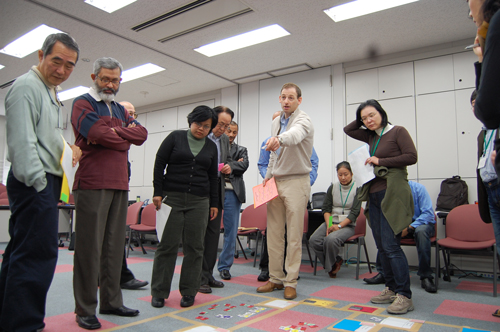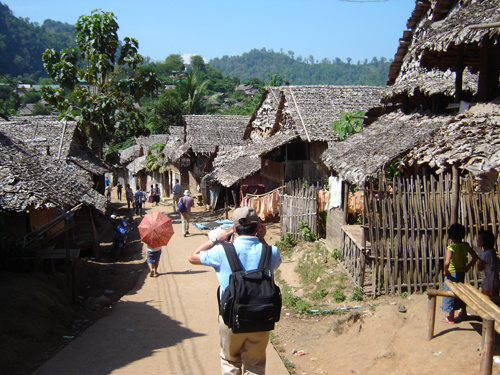
Coursework of the Program for Human Resource Development in Asia for Peacebuilding (February, Hiroshima; photo: Hiroshima Peacebuilders Center (HPC))
CHAPTER 3Japan�s Foreign Policy in Major Global Issues |
1. |
Efforts for Peace and Stability of Japan and the International Community |
The current international security environment has changed qualitatively from that of the Cold War era. While the probability of conflict among major powers is decreasing, non-traditional threats have intensified, including the proliferation of weapons of mass destruction and missiles, increases of international terrorism and piracy, as well as global issues such as those related to poverty, the environment, refugees, illegal narcotics, and infectious diseases. In such a context, in order for Japan to maintain its territorial integrity, protect the lives and properties of Japanese nationals, and ensure prosperity and development, it is necessary for Japan to have a multi-faceted security policy to address not only traditional threats but also non-traditional threats.
Specifically, in addition to maintaining and reinforcing the Japan-U.S. Security Arrangements, it is important to continue to actively pursue diplomatic efforts to enhance stable international relations with neighbouring countries, efforts towards fostering peace and stability in the international community and development of appropriate defence capabilities which will support the preceding efforts. The Japan-U.S. security arrangement has functioned effectively as a basic framework supporting the stability and development of the Asian Pacific region and has brought peace and prosperity to Japan and the Far East. At the same time, as demonstrated by North Korea�s ballistic missiles and nuclear issues, elements of unpredictability including the situations surrounding the Taiwan Strait and the Korean Peninsula still exist in the Asia Pacific region, even after the end of the Cold War. Under these circumstances, it is important to further deepen the security arrangement between Japan and our ally, the United States, to ensure the peace and security of Japan and of the region. Marking the 50th anniversary of the signing of the current Japan-U.S. Security Treaty in 2010, the two countries continue to collaborate for the purpose of strengthening cooperation not only bilaterally, but also in addressing issues concerning the Asia-Pacific region and global issues, and deepening the Japan-U.S. alliance in order to adapt to the environment of the 21st century.
In the Asia-Pacific region, we have not yet developed a multilateral collective defence security mechanism similar NATO in Europe, due to such factor as the diversity of political and economic systems, cultures, and ethnicities. Instead, regional stability has been maintained primarily through various bilateral security arrangements centered on the U.S.. In Japan�s view it is both practical and appropriate to improve and strengthen the regional bilateral, multilateral dialogues and a regional framework to strengthen economic interdependence in a multilayered manner, while securing the presence and engagement of the U.S. so as to realize a stable security environment surrounding Japan and to ensure peace and stability in the Asia-Pacific.
The role of the United Nations has become increasingly important. As the sole international organization with universal membership and comprehensive capacities, the UN continues to work for the maintenance of peace and security through such organs as the General Assembly and the Security Council. In addition, it promotes friendly relations among countries, and encourages international cooperation to resolve economic, social, cultural and humanitarian issues and to promote human rights.
Japan intends to make an active use of the UN and to strengthen it, so as to advance its national interests in the international community and to cope with the above-mentioned challenges under multilateral framework. For that purpose, Japan is striving for an early realization of UN reform, especially the Security Council reform, and is playing a leading role in major international organizations including the UN and making human resources and financial contributions.
Japan is also actively engaged in certain issues pertaining to specific international agendas. Japan is actively involved in disarmament and non-proliferation, as Japan has always regarded this endeavor as essential in improving its security environment and in achieving a peaceful world. In 2009, heads of state met to discuss nuclear disarmament and non-proliferation at the UN Security Council for the first time. In the context of this growing international momentum, Japan has played a leading role in the maintenance and enhancement of the disarmament and non-proliferation regime based on the Nuclear Non-Proliferation Treaty (NPT).
Furthermore, Japan is playing a proactive role in addressing regional conflicts, terrorism and transnational organized crimes which all are on rise around the world. In addition, as a maritime and trading country, ensuring maritime security and safety of maritime navigation is not only crucial for the prosperity of Japan, but also important to the economic development of the region. In particular, the number of pirate attacks off the coast of Somalia and in the Gulf of Aden in 2009 was 217, which is approximately twice the number of incidents in 2008, and also the number of attacks in the Somali Basin has been on surge. Based on the view that piracy will remain as an issue of international concern, Japan is exerting efforts by taking a multi-faceted approach to ensure maritime security and safety of maritime navigation. This includes not only the deployment of Japan Self Defence Forces (JSDF), namely two destroyers and two P-3C maritime patrol aircraft, off the coast of Somalia and in the Gulf of Aden to address the immediate concern, but also long and mid-term efforts such as assistance for capacity building of coastal countries� capabilities for preventing and suppressing piracy and for regional cooperation, and furthermore, assistance toward the stabilization of the situation in Somalia.
Regarding regional conflicts and civil wars that still prevail around the world, the importance of peacebuilding is increasingly recognized. Peacebuilding is a seamless effort ranging from the promotion of peace processes and emergency humanitarian assistance in the immediate aftermath of conflicts to security maintenance, reconstruction and long term development. In order to build the foundations for sustainable peace and the prevention of recurrence of conflicts, Japan has designated peacebuilding as one of its major diplomatic priorities. To this extent, we are advancing tangible efforts such as contributing to UN Peacekeeping Operations (UNPKO) and other organizations, conducting on-site efforts utilizing ODA, making intellectual contributions and fostering human resources.

Coursework of the Program for Human Resource Development in Asia for Peacebuilding (February, Hiroshima; photo: Hiroshima Peacebuilders Center (HPC)) |
In terms of terrorism, following the terrorist attacks on the U.S. on September 11, 2001, the international community has designated the countering of terrorism as one of its most urgent priorities and reinforced the development of counter-terrorism measures through multilateral frameworks including the UN and the G8, bilateral cooperation and assistance for security measures in developing countries. As our fundamental policy, Japan refuses to justify or accept terrorism under any circumstance.
With the increased migration of people and sophistication of information technology, transnational organized crimes that transcend borders such as drug trafficking, cyber crimes, and money laundering are developing and further geographically expanding. This is a problem that cannot be managed by one country alone and requires the coordinated efforts of partnerships between international and regional organizations. Vigorous efforts are being made in this field by institutions such as the UN, the G8 and the Financial Action Task Force (FATF), and Japan is actively participated in these international undertakings.
Human rights and democracy are universal values. Sufficient development of these foundations in each country contributes to the establishment of a peaceful and prosperous society and therefore to the peace and security of the international community. Japan will strengthen its foreign policy in order to promote human rights and democracy in a comprehensive manner, through the development of human rights and democratic foundations based on development assistance, and by linking efforts in multilateral for a such as the UN related to human rights and democracy, and bilateral efforts including human rights dialogues and development assistance.

Myanmar refugee camp (Thailand) |
Furthermore, Japan regards the promotion of the �rule of law� in the international community as one of the major pillars of its diplomatic policies and has actively engaged in various efforts towards this end. The establishment of the �rule of law� in the international community promotes stability of relations between nations, peaceful settlement of disputes and �good governance� within countries. It is also important for securing territorial and maritime interests of Japan as well as private and corporate activities at the international level.